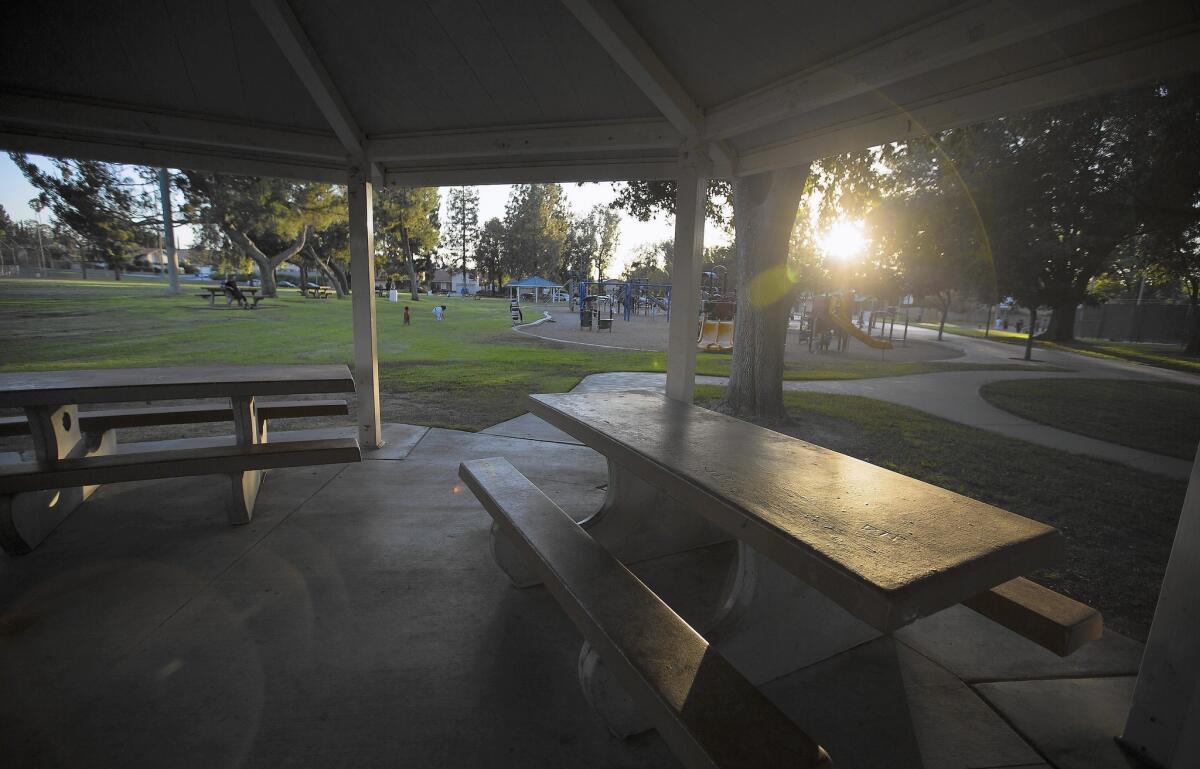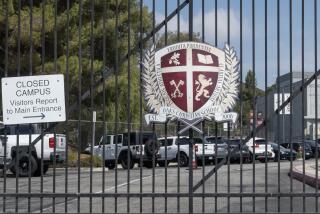Teens’ attack on Chinese girl draws comparison to ‘Lord of the Flies’ from judge

It started as an ordinary spat among high school girls, sparked by an unpaid restaurant bill.
At an ice cream parlor in Rowland Heights, the dispute took a dark turn.
Three girls ganged up on Yiran “Camellia” Liu, forcing her to kneel and use her hands to wipe cigarette butts and ice cream smears off the floor, according to Liu’s court testimony.
More teenagers joined the fray. Liu testified that they took her to a nearby park, where they stripped her naked, kicked her with high-heeled shoes, slapped her hundreds of times and burned her nipples with cigarettes.
They cut off her hair and made her eat it, she testified. Someone snapped cellphone photos of her.
A girl named Helen said to the others, “Just slow it down and don’t hit her so hard, and we can do it a longer stretch of time,” Liu testified at a preliminary hearing.
The March 30 attack has prompted soul-searching not just in Rowland Heights but also in China — the victim and her alleged attackers were “parachute kids,” part of a new wave of Chinese youngsters who live in Southern California and attend local schools while their parents remain back home.
Parachute kids typically stay in private homes in the San Gabriel Valley, paying for room, board, transportation and substitute parenting from their hosts. Most are in high school, though some are younger, studying here to get a jump start on admission to an American college.
In the attack on Liu, who is 18, three teenagers have been charged as adults and pleaded not guilty to torture, kidnapping and assault. Attorneys for Yunyao “Helen” Zhai, 19, and Yuhan “Coco” Yang, 18, acknowledge that their clients participated in the attack and said they hope to reach plea agreements that dismiss the most serious charges. Torture carries a life prison sentence with the possibility of parole. A lawyer for the third defendant, Xinlei “John” Zhang, 18, argued in court that his client was only a bystander.
Zhai and Zhang have also pleaded not guilty to charges in the beating and burning of a second teenage victim in a separate incident at a Diamond Bar strip mall three days earlier. In juvenile court, two other teenagers admitted to assault in one or both incidents, according to the Los Angeles County district attorney’s office. Authorities believe that additional teens involved in the incidents have fled the country.
About two weeks after the attacks, the father of one of the juvenile suspects was arrested on suspicion of attempting to dissuade the victims from pursuing the cases by offering them money, according to a sheriff’s detective. No charges have been filed, a district attorney spokeswoman said.
For parachute kids, living in the U.S. is a chance to learn a new language and culture and to escape China’s ultra-competitive college entrance exams. Some thrive in their new environment and go on to colleges such as UC Berkeley and UC San Diego. For others, struggles with dating, friendships or school can spiral out of control without the steadying influence of parents and other family members.
The court testimony of Liu and the second victim offers a glimpse into a world devoid of adults, centered on the Chinese teahouses and karaoke parlors of the east San Gabriel Valley, where some of these teenagers drive Mercedes cars and stay out past 2 a.m. on school nights.
At the preliminary hearing for the three defendants being tried as adults, Judge Thomas C. Falls said the case reminded him of “Lord of the Flies,” William Golding’s 1954 novel about boys stranded on a deserted island.
“I’m sure they suffer loneliness,” Rayford Fountain, Yang’s attorney, said of parachute kids. “So they bond with other kids in the small Chinese circles with no supervision, no one to turn to for assistance. So these things can get out of control.”
::
It is easy to drive down Colima Road in Rowland Heights and not notice Oxford School, a cluster of portable classrooms tucked away in the back of a strip mall.
There are three worn basketball hoops, a volleyball net and a soccer goal on a small patch of parched grass. The school basketball team is not part of any interscholastic league; it plays pickup games at a local park.
Some of the students involved in the assaults were enrolled in the school, according to their defense attorneys and the sheriff’s detective, and paid about $13,000 a year to take classes with 140 other international students, mostly from China. Marylee Hull, the school’s principal, said most Oxford students are in the U.S. without their parents and live in “homestays” — private homes where the homeowner collects room and board and registers as the child’s legal guardian.
The school has a homestay coordinator and sets up some of the accommodations. Others are arranged directly by parents. Many homestay guardians keep in close touch with the school, Hull said.
Hull would not confirm that any of the teenagers involved in the assaults attended the school or comment on the charges against them.
The parachute kid phenomenon dates back to the 1980s and 1990s, when wealthy Taiwanese and Hong Kong families sent their children to live in upscale suburban L.A. neighborhoods, either with relatives or alone in a property purchased by the family.
In recent years, there has been a surge of children from mainland China coming to the San Gabriel Valley without their parents to study on the F-1 student visa traditionally used by college and graduate students. Local Chinese-language newspapers are full of homestay ads for junior high and high school students in Arcadia, San Marino, Rowland Heights, Temple City and Walnut.
The number of students attending American high schools on F-1 visas has increased from about 1,700 in 2009 to more than 80,000 in 2014, according to statistics compiled by the Council on Standards for International Educational Travel. Of the 15,000 or so foreign high school students in California in 2014, more than 9,200 were from China. The vast majority were attending private schools.
Joaquin Lim, a former mayor of Walnut who runs a company that helps place Chinese students in American schools, said he requires homestay parents to pass criminal background checks and sign agreements about what kind of meals they will provide and what language is spoken in the home. But the growing homestay industry is largely unregulated.
“There are a lot of scams and scandals, and I believe it’s about time we should set some standards,” Lim said.
While some parachute kids are wealthy, the parents of the defendants in the assault case were people of more modest means who had scraped together money to buy their children an American education, said Daniel Deng, an attorney who is advising some of the defendants’ families and represents one of the juvenile defendants.
“They thought it was best for their kids. They thought they would get the best education,” Deng said. “They not only lost their life savings, but now their children’s futures are in jeopardy.”
::
On June 18, Zhai, Yang and Zhang entered a Pomona courtroom in blue jail scrubs, their hands shackled behind their backs. With bail set at $3 million each, they have remained in custody since their arrests shortly after the attack.
Each pleaded not guilty as interpreters explained the proceedings to them in Mandarin.
Fountain, Yang’s attorney, said his client, who did not know Liu, was going along with the crowd and following Zhai’s orders.
“She was more of a follower than a leader,” he said after the hearing. “She’s a very young girl. She was not mature enough to evaluate everything happening in the park and make a more careful decision.”
Deng said the attack on Liu was motivated not only by the unpaid dinner bill but by conflicts over a boy and by social media posts disparaging Zhai’s hometown, Shanghai.
Liu testified during the preliminary hearing that Zhai gave orders to the others but did not always participate in the hands-on abuse. Zhai’s attorney, Evan Freed, said outside the courtroom that his client was not the ringleader.
Fountain and Freed have requested that their clients be evaluated by court-appointed psychologists.
The case was partly about high school pecking orders, the prosecutor, Elizabeth Padilla, said in an interview. But, she added, “it was unusual to see it go to the extent that it did.”
In a closed proceeding last week, one of the juvenile defendants admitted to two counts of assault with a deadly weapon for actions that included passing a cigarette to an attacker. He was sentenced to seven to nine months of juvenile camp, said Deng, his attorney.
The boy apologized during the hearing, Deng said, and the judge read a statement of apology from the boy’s parents.
In China, the case has prompted a flood of commentary in mainstream media and online.
Some of the discussion has centered around the American courts, and some commentators praised a legal system that brought criminal charges against the bullies. Bullying cases involving students in China are typically settled by the schools and the families, including some instances where bribes are used to smooth over the situation, commentators said.
Wang Huiyao, president of the Beijing-based think tank Center for China & Globalization, pointed to the increase in unaccompanied overseas students — particularly middle-schoolers — as a cause for concern.
“You have to keep track of your children and stay in touch with them,” Wang said on a Chinese television segment devoted to the Rowland Heights case.
Harvard Zhang in The Times’ Beijing bureau contributed to this report.
Read the Chinese translation of this story
ALSO:
Ex-state Sen. Leland Yee pleads guilty to racketeering in corruption case
Woman with amnesia and cancer identified; family found
California residents cut water use by hefty 29% in May, officials say
More to Read
Sign up for Essential California
The most important California stories and recommendations in your inbox every morning.
You may occasionally receive promotional content from the Los Angeles Times.












